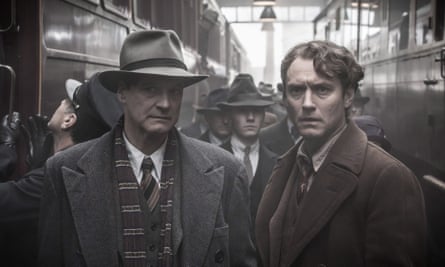Red pencils at the ready. This one needs a going over. Shot in musty sepia, dragged in and out of baffling slow motion, Genius is a story about editing that packs a lot of padding. The first film from theatre director Michael Grandage, it’s a biopic about literary editor Max Perkins and his client, Thomas Wolfe. It features a performance of vaudevillian gusto by Jude Law as the author. Colin Firth is – in his measured way – equally as hammy playing Perkins.
Unlike many writers, who have to dig for every word, Wolfe didn’t know when to stop. He had a wild talent that needed taming. Only Perkins, who had already honed the work of Scott Fitzgerald and Ernest Hemingway, understood how to subdue the author’s 5,000-page manuscripts into market-ready books. On the way to producing Look Homeward, Angel (1929) and Of Time and the River (1935), they argued over every syllable. Their tumultuous working relationship (Wolfe was insecure that his talent was worthless without Perkins) shrouded a friendship that was often – for Perkins’s wife (a nothing part for Laura Linney) and Wolfe’s lover, theatre designer Aline Bernstein (Nicole Kidman) – exclusionary.
Here they are – inspiration and its moderator – chipping away at the meaning of great art. Outside the window, depression-era New York falls to pieces. Perkins shapes the work of “an ugly lump of Carolina clay” (Wolfe’s words, or an approximation of them) into something beautiful, while Wolfe introduces the staid family man to the abandon of the jazz age. It all sounds extremely exciting, but through a combination of grating performances and unadventurous production design, Genius becomes a trundle.

Wolfe wanted to write America. His exotic ramblings about its rhythms and flows would go on to inspire the Beat generation. Yet it’s difficult to see how the vision presented here would inspire more than a pamphlet. Grandage’s New York is mostly the publisher’s offices, Wolfe’s apartment, and the Perkins suburban family home. There’s no sense of the excitement that sparked Wolfe’s imagination. In one scene, the duo stride up from the docks into New York’s bustle and hum. I swear I saw the green screen curtain the production crew had rigged, to give the small set a sense of grandeur, twitch in the breeze.
There would be nothing wrong with telling the story to scale, if Law’s performance didn’t trample over any sense of subtlety. His Wolfe is a table-slapping, foot-stamping, hell-dodging horn dog and the film can hardly hold him. He drags Perkins up to Harlem to introduce him to life. The jazz club is fairly swinging with hip cats and gorgeous harlots, all delighted to see these two white boys join in the fun. It’s like a Disneyland version of the era, with Firth and Law stuffed into the outsized costumes of literary greats.
Your ticket price includes a ride with Hemingway (Dominic West) and Fitzgerald (Guy Pearce), as well as ample time with Kidman’s viper-eyed take on Bernstein, who – with some justification – was jealous of Perkins for distracting Wolfe from her. Hemingway thinks Wolfe’s work is bullshit. Fitzgerald, blocked and desperate to write, just shelters himself and his fragile wife Zelda (Vanessa Kirby) from the verbal storm. As in Midnight in Paris, these titans don’t really carry any dramatic weight. They’re just here to show face, then fold back into the history books.
There’s been talk of Genius hacking its way into the running for next year’s Oscar race. I still wouldn’t put it past it. It taps into the legend of great art, upper-casing the personalities and trimming away the boring hard work. The platonic romance between Max and Tom shaped the books, but Genius doesn’t really explain the talents of either, it just relies on you to accept them. The ride ends, having taken an awful lot of time, and far too many words, to get there.

Comments (…)
Sign in or create your Guardian account to join the discussion